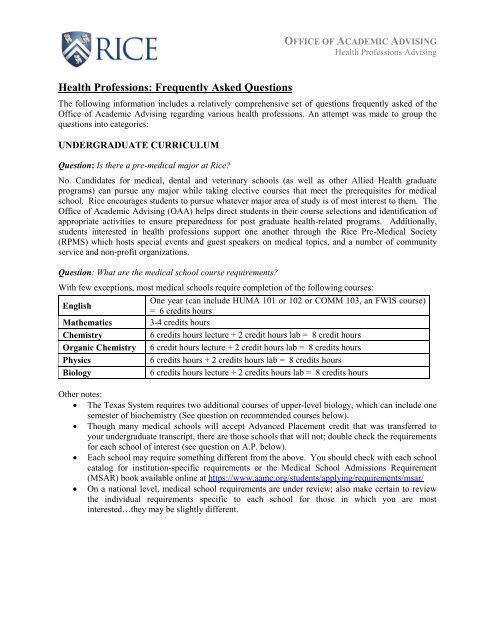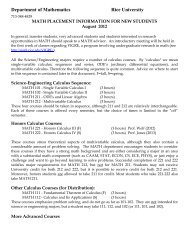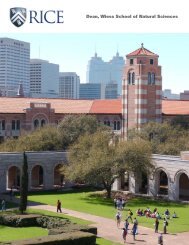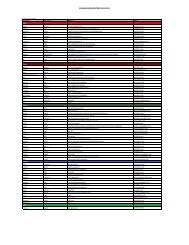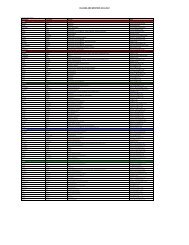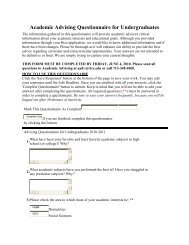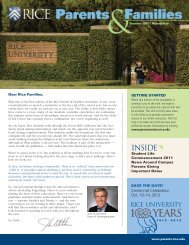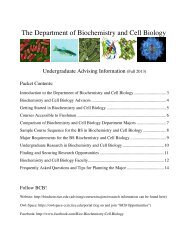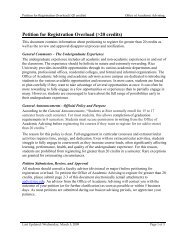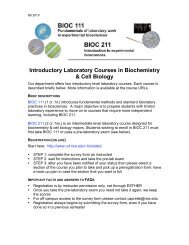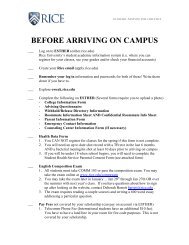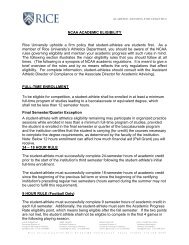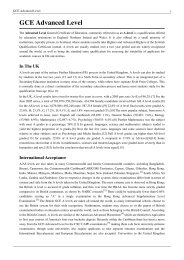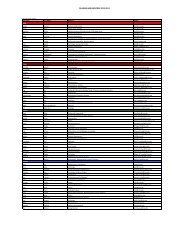Health Professions FAQs - Rice University
Health Professions FAQs - Rice University
Health Professions FAQs - Rice University
You also want an ePaper? Increase the reach of your titles
YUMPU automatically turns print PDFs into web optimized ePapers that Google loves.
<strong>Health</strong> <strong>Professions</strong>: Frequently Asked Questions<br />
OFFICE OF ACADEMIC ADVISING<br />
<strong>Health</strong> <strong>Professions</strong> Advising<br />
The following information includes a relatively comprehensive set of questions frequently asked of the<br />
Office of Academic Advising regarding various health professions. An attempt was made to group the<br />
questions into categories:<br />
UNDERGRADUATE CURRICULUM<br />
Question: Is there a pre-medical major at <strong>Rice</strong>?<br />
No. Candidates for medical, dental and veterinary schools (as well as other Allied <strong>Health</strong> graduate<br />
programs) can pursue any major while taking elective courses that meet the prerequisites for medical<br />
school. <strong>Rice</strong> encourages students to pursue whatever major area of study is of most interest to them. The<br />
Office of Academic Advising (OAA) helps direct students in their course selections and identification of<br />
appropriate activities to ensure preparedness for post graduate health-related programs. Additionally,<br />
students interested in health professions support one another through the <strong>Rice</strong> Pre-Medical Society<br />
(RPMS) which hosts special events and guest speakers on medical topics, and a number of community<br />
service and non-profit organizations.<br />
Question: What are the medical school course requirements?<br />
With few exceptions, most medical schools require completion of the following courses:<br />
English<br />
One year (can include HUMA 101 or 102 or COMM 103, an FWIS course)<br />
= 6 credits hours<br />
Mathematics 3-4 credits hours<br />
Chemistry 6 credits hours lecture + 2 credit hours lab = 8 credit hours<br />
Organic Chemistry 6 credit hours lecture + 2 credit hours lab = 8 credits hours<br />
Physics 6 credits hours + 2 credits hours lab = 8 credits hours<br />
Biology 6 credits hours lecture + 2 credits hours lab = 8 credits hours<br />
Other notes:<br />
� The Texas System requires two additional courses of upper-level biology, which can include one<br />
semester of biochemistry (See question on recommended courses below).<br />
� Though many medical schools will accept Advanced Placement credit that was transferred to<br />
your undergraduate transcript, there are those schools that will not; double check the requirements<br />
for each school of interest (see question on A.P. below).<br />
� Each school may require something different from the above. You should check with each school<br />
catalog for institution-specific requirements or the Medical School Admissions Requirement<br />
(MSAR) book available online at https://www.aamc.org/students/applying/requirements/msar/<br />
� On a national level, medical school requirements are under review; also make certain to review<br />
the individual requirements specific to each school for those in which you are most<br />
interested…they may be slightly different.
Question: Can I take prerequisites over the summer at <strong>Rice</strong> or another school?<br />
OFFICE OF ACADEMIC ADVISING<br />
<strong>Health</strong> <strong>Professions</strong> Advising<br />
Yes. It is possible to take prerequisites over the summer as long as they are taken at a reputable four year<br />
institution. Keep in mind, it is not recommended that you take too many of the prerequisites at a different<br />
institution and during the summer months. Summer courses often squeeze a semester of work into five<br />
weeks. Such a short time does not always foster the level of mastery you should achieve in the course.<br />
Additionally, much of the content taught in prerequisite courses is tested on the Medical College<br />
Admission Test (MCAT) or Dental Admission Test (DAT), or other tests, so mastery, over the long term,<br />
is essential to you performing well in upper level course work and entrance exams. Students who take a<br />
course during the summer and at another institution should complete the Undergraduate Transfer Credit<br />
Request Form and secure approval from the appropriate transfer credit advisor, prior to enrollment in that<br />
course if the student needs degree credit and/or major requirements at <strong>Rice</strong>. Courses transferred to <strong>Rice</strong><br />
will not be calculated into your <strong>Rice</strong> grade point average. However, the medical schools will use these<br />
course grades when calculating your overall GPA.<br />
Question: Is it necessary to major in a science discipline in order to apply to medical school?<br />
It is definitely not necessary to select a basic science major when pursuing medical school. Selecting a<br />
non-science major will not diminish your ability to gain admission to medical school. The Association of<br />
American Medical Colleges (AAMC) states the following concerning choice of undergraduate<br />
major/courses:<br />
“Medical schools recognize the importance of a strong foundation in the natural sciences—biology,<br />
chemistry, physics, and mathematics—and most schools have established minimum course<br />
requirements for admission. These courses usually represent about one-third of the credit hours needed<br />
for graduation. This approach deliberately leaves room for applicants from a broad spectrum of<br />
college majors, including those in the humanities and social sciences. No medical school requires a<br />
specific major of its applicants or matriculants. Admission committee members are aware that medical<br />
students can develop the essential skills of acquiring, synthesizing, applying and communicating<br />
information through a wide variety of academic disciplines. Nevertheless, many premedical students<br />
choose to major in a scientific discipline. Ideally, they do so because they are fascinated by science<br />
and perceive that such a major can be the foundation for a variety of career options. Choosing science<br />
primarily to enhance one’s chances for admission to medical school is not in a student’s long-term best<br />
interest. Medical school admission committees seek students whose intellectual curiosity leads them to<br />
a variety of disciplines and hose intellectual maturity assures that their efforts are persistent and<br />
disciplined. In fact, practicing physicians often recommend that, during their college years, premedical<br />
students take advantage of what might be their last opportunity for the study of non-science areas<br />
(music, art, history, and literature) that might become avocational interests later in life.”<br />
Also note that according to the AAMC – FACT website, humanities majors statistically tend to score<br />
above average, showing that what you major in does not matter. As long as pre-med requirements are<br />
fulfilled, a pre-medical student can major in any discipline of interest. Additionally, if majoring in a nonscience<br />
discipline, it is recommended that at least two more advanced biology courses are taken beyond<br />
the medical school requirements.
OFFICE OF ACADEMIC ADVISING<br />
<strong>Health</strong> <strong>Professions</strong> Advising<br />
Question: Should I use Advanced Placement (AP) credits to fulfill my premedical requirements?<br />
This is a question that must be answered on a case by case basis. Only a student can know if they have<br />
really mastered AND retained the information learned in an advanced placement course. In general,<br />
Advanced Placement Credit will satisfy some premedical requirements for many, but not all medical<br />
schools. However, there are several precautions:<br />
� Not all medical, dental, and veterinary schools accept AP credit. Students need to check catalogs or<br />
web pages to determine each school’s AP policies or can view the OAA website document titled<br />
Advanced Placement Acceptance by Medical Schools.<br />
� If a student chooses to rely on a large number of AP credits to satisfy premedical requirements, it<br />
leaves little for an admissions committee to make an assessment.<br />
� There is no AP credit granted for General Biology Laboratory. Students need to complete at least 2<br />
credit hours of Biology lab during their undergraduate tenure.<br />
� If a student satisfies the general biology and general chemistry requirements with AP credits, they<br />
should also complete at least 2 semesters of upper level course work in each discipline. There are<br />
several reasons for this:<br />
� To satisfy the requirement at those schools that do not accept AP credit in those<br />
disciplines<br />
� To reinforce what was learned in the general level courses<br />
� To establish capability of performing well at the college level in each discipline<br />
� To confirm mastery of the foundational material presented in each of the general courses<br />
for which the students has AP credit<br />
Question: What if I’m not doing well in one of my prerequisites?<br />
There are many reasons why students do not perform at their best, but there are tremendous resources at<br />
<strong>Rice</strong> to help. However, it is the student’s responsibility to take initiative when they are struggling in a<br />
course, and their greatest mistake is to wait too long before seeking academic assistance. Students should<br />
see an advisor and discuss options at the first sign of struggling with understanding concepts or<br />
performing less than ideal in a course. For more information, view the Academic Assistance tab on the<br />
Office of Academic Advising home page.<br />
Question: Is it discouraged to take a class using the grade mode pass/fail?<br />
Yes. Many medical schools will not consider any pass/fail courses as fulfilling premedical requirements.<br />
Even in cases where it is not absolutely prohibited, it is inadvisable to take pre-medical requirements<br />
pass/fail. A "D" counts as a "Pass" in a pass/fail course, and a "D" is probably what skeptical admissions<br />
committee members will assume was earned in the course. Courses that are not pre-medical requirements<br />
can be taken pass/fail, but those should be kept to a minimum.<br />
OTHER OPPORTUNITIES<br />
Question: In addition to taking the courses required for admission to medical school, what should I be<br />
doing during semesters and during summer breaks?<br />
Extracurricular activities are an important part of a medical school application. Some good examples<br />
include health-related activities, especially clinical experiences, volunteer opportunities, independent<br />
research, travel, study abroad and jobs in the Texas Medical Center. Whatever endeavors are chosen, it’s<br />
important to commit to it for a period of time to demonstrate commitment and a sustained effort. It can
OFFICE OF ACADEMIC ADVISING<br />
<strong>Health</strong> <strong>Professions</strong> Advising<br />
also be quite helpful to seek out leadership positions. For summer opportunities, see the link under the<br />
Experience Opportunities and Scholarships page on the Office of Academic Advising website<br />
(www.rice.edu/advising). For volunteer opportunities students should explore the <strong>Rice</strong> <strong>University</strong><br />
Community Involvement Center:<br />
http://www.ruf.rice.edu/~service/programs/asb/oldasb/asb03/mex_03_app.htm<br />
Question: How do I obtain research experience?<br />
The easiest way to obtain research experience is to contact a <strong>Rice</strong> professor about volunteering in their lab<br />
or working there for course credit. Most professors have a website listing their current research. Ideally, a<br />
student should pick a lab that peaks their interest. If planning on conducting research for course credit, see<br />
the BIOC 310 website www.bioc.rice.edu/bios310. Also explore the Office of Fellowships and<br />
Undergraduate Research website for research opportunities:<br />
http://cohesiondev.rice.edu/administration/undergradresearch_dev/index.cfm.<br />
Research experience can also be obtained at the Medical Center. Read about faculty research interests at<br />
Baylor and M.D. Anderson and e-mail faculty members directly, including a resume and a request to meet<br />
and discuss their research.<br />
Question: When is a good time to start gaining clinical experience?<br />
It’s never too early to start gaining clinical experience. Clinical experience is absolutely necessary for<br />
students to learn about medicine and to show commitment to medicine as a career. Direct interaction with<br />
patients and medical personnel through work or volunteering in a hospital is preferable to simply<br />
observing clinicians as they work, but shadowing is also very helpful, and it is never too early to start.<br />
Shadowing demonstrates that the student has taken the initiative to gain first-hand experience in the field.<br />
To get the best insight, the student should shadow doctors in a variety of fields and settings. Even<br />
students with strong grades and recommendations are sometimes not admitted to medical school if they<br />
have had no contact with doctors and hospitals in the two or three year period before applying.<br />
Question: Are emergency medical services at <strong>Rice</strong> sufficient for gaining clinical experience?<br />
Emergency Medical Technicians (EMT) and Emergency Medical Services (EMS):<br />
It is natural for pre-medical students to be interested in participating in organizations related to emergency<br />
medicine and possibly becoming certified as an EMT. However, many medical schools seem to want<br />
applicants to have had contact specifically with doctors and hospitals. Emergency medical services are<br />
great supplements, but not substitutes for, contact with doctors and hospitals, at least in the eyes of some<br />
admissions committees.<br />
Question: Can I still study abroad? Is it okay to take prerequisites at an international institution?<br />
Absolutely, with careful academic planning, pre-med students can still study abroad. Students who major<br />
in science or engineering can also study abroad and successfully apply to medical school. However,<br />
having AP credit or majoring in a non-science field usually gives students more flexibility to study<br />
abroad. In most instances this type of experience will enhance your resume and will not detract from a<br />
student’s major focus. However, it is NOT recommended that students take pre-med requirements abroad.<br />
Many medical schools will not accept credits from international institutions. It is also difficult to find<br />
courses at foreign universities that fulfill exact science requirements for U. S. medical schools, and<br />
medical school admission committees usually want to see the 8 minimum premedical lab science<br />
requirements on a transcript from a U.S. college or university.
ADVISING MEETINGS<br />
Question: When should I meet with the OAA for <strong>Health</strong> <strong>Professions</strong> Advising?<br />
OFFICE OF ACADEMIC ADVISING<br />
<strong>Health</strong> <strong>Professions</strong> Advising<br />
<strong>Health</strong> professions advising at <strong>Rice</strong> is handled by an entire community of advising. During O-Week, new<br />
students are introduced to Divisional Advisors (faculty advisors), Peer Academic Advisors (PAAs),<br />
student O-Week advisors and co-advisors, and faculty major advisors from academic departments. Each<br />
has significant training and/or resources provided by the Office of Academic Advising regarding health<br />
professions. Most student questions can be answered accurately and efficiently by asking any member of<br />
this large community, most of whom are readily available in the residential colleges. However, if students<br />
need additional assistance regarding health professions, they should call 713-348-4060 to set an<br />
appointment with one of five Official <strong>Health</strong> <strong>Professions</strong> Advisors (OHPAs) registered with the<br />
Association of American Medical Colleges (AAMC). While most students may be interested in medicine,<br />
information is also available about related fields, such as dentistry, veterinary medicine, pharmacy,<br />
optometry, podiatry, public health, physical therapy and other allied health programs. The Office of<br />
Academic Advising provides a comprehensive list of related online resources via their website at<br />
www.rice.edu/advising.<br />
Also, the OAA hosts a <strong>Health</strong> <strong>Professions</strong> Advising Orientation in early fall as well as Freshman Sessions<br />
and Sophomore Sessions throughout the academic year. For students planning on applying in the current<br />
application cycle, the OAA hosts Junior Open-File Sessions. Please see the OAA website at<br />
www.rice.edu for details.<br />
HEALTH PROFESSIONS OPTIONS<br />
Question: What is the difference between a Doctor of Osteopathic Medicine (DO) and a Medical Doctor<br />
(MD)?<br />
The main difference is that doctors of osteopathic medicine complete extra training in the musculoskeletal<br />
system. Additionally, while the Association of American Medical Colleges (AAMC) accredits the 130<br />
U.S. medical schools that award the M.D. degree, the American Osteopathic Association’s (AOA)<br />
Commission on Osteopathic College Accreditation (COCA) accredits the 25 colleges that award the D.O.<br />
degree. The following link provides more information about the American Osteopathic Association:<br />
http://www.osteopathic.org/. The following link provides information about the American Association of<br />
Colleges of Osteopathic Medicine: http://www.aacom.org<br />
Question: What is a D.P.M.?<br />
A D.P.M. is a Doctor of Podiatric Medicine or podiatrist. There are less than a dozen colleges of podiatric<br />
medicine in the United States an all are governed by the American Association of Colleges of Podiatric<br />
Medicine (AACPM). The following link provides more information: http://www.aacpm.org/.
Question: What are combined degree programs?<br />
Combined degree programs include:<br />
� MD/JD: combined degree in medicine and law<br />
� MD/MBA: combined degree in medicine and business<br />
� MD/MPH: combined degree in medicine and public health<br />
� MD/PhD combined degree in medicine and research<br />
� MD/DDS: combined degree in medicine and oral & maxillofacial surgery<br />
OFFICE OF ACADEMIC ADVISING<br />
<strong>Health</strong> <strong>Professions</strong> Advising<br />
To find what programs are available at a particular medical school, search the Curriculum Directory on<br />
the AAMC website: http://services.aamc.org/currdir/index.cfm.<br />
Question: What are other health profession options?<br />
Some of the more popular health professions include (allied health sciences), but are not limited to:<br />
dentistry, veterinary school, nursing, pharmacy, optometry, the therapies (physical therapy, occupational<br />
therapy, speech therapy) and neuroscience. See www.explorehealthcareers.org for more information.<br />
Question: What are good sources for investigating my options and choosing schools to apply to?<br />
The AAMC website is a good source of information on various schools: www.aamc.org. Additionally, the<br />
Medical School Admission Requirements (MSAR) is an AAMC publication that offers a wealth of<br />
information to help make the decision. The Office of Academic Advising keeps copies for your review or<br />
the publication can be purchased on the AAMC website.<br />
Question: Where can I find a list of medical schools?<br />
A list of medical schools can be found at http://services.aamc.org/memberlistings/index.cfm<br />
MEDICAL COLLEGE ADMISSION TEST (MCAT)<br />
Question: When should I take the MCAT?<br />
Students should consider taking the MCAT soon after completing premedical requirements. Most <strong>Rice</strong><br />
students prepare and study during the summer following the sophomore year for the June, July, August,<br />
or September MCAT administration dates. The MCAT is now exclusively administered as a computerbased<br />
examination. With the advent of this administration, there are now more than 20 test dates in a<br />
calendar year. For most medical schools, the final opportunity to take the MCAT (if a student wants to<br />
attend medical school immediately after graduating from <strong>Rice</strong>) is September following the junior year.<br />
However, May, June, or July test dates are recommended. More information on the MCAT can be found<br />
on the MCAT website: http://www.aamc.org/students/mcat/start.htm.<br />
Question: How can I register for the MCAT?<br />
Information on how to register and online registration is found at:<br />
http://www.aamc.org/students/mcat/reserving/start.htm.
OFFICE OF ACADEMIC ADVISING<br />
<strong>Health</strong> <strong>Professions</strong> Advising<br />
Question: What are the advantages and disadvantages to taking the MCAT more than once?<br />
Ideally, students score their greatest possible score the first time they take the test. Therefore, students<br />
should prepare thoroughly for the exam. However, it is not uncommon or detrimental to take the test a<br />
second time. Taking the MCAT a second time allows for targeted preparation based on identified<br />
weaknesses from the first exam and increases the likelihood of improving a score. However, preparation<br />
is absolutely critical if taking the exam a second time. Clearly, performing worse the second time around<br />
is not looked upon favorably.<br />
Question: How do I study for the MCAT?<br />
Studying for the MCAT depends on your particular study habits. If a student is self-disciplined, they can<br />
begin studying on their own by reviewing Biology, Chemistry, Physics, and Organic Chemistry, or by<br />
purchasing one of the study books released by the commercial sources (e.g. Princeton, Examkrackers,<br />
Kaplan). To prepare for the writing section, students should keep up with current events, practice writing,<br />
and read more frequently. If a student does not typically read passages on-line, they should start doing so<br />
to train for the format of passages that appear on the exam. If a student will be more motivated taking a<br />
course, there are a variety of commercialized courses available throughout the year. In addition, the<br />
AAMC just recently published The Official Guide to the MCAT Exam, which can be purchased through<br />
their website. The AAMC also includes study tips on their website:<br />
https://www.aamc.org/students/applying/mcat/preparing/85558/study_plan.html.<br />
Question: What is the average MCAT score?<br />
The national average of scores for applicants and matriculants to medical schools can be found at the<br />
following: https://www.aamc.org/students/applying/mcat/admissionsadvisors/mcat_stats/. Available on<br />
the AAMC website is also a grid that shows acceptance rates based on GPA and MCAT score (see page<br />
11): https://www.aamc.org/students/download/267622/data/mcatstudentselectionguide.pdf.<br />
<strong>Rice</strong> student averages are as follows:<br />
Mean Cumulative Grade Point Average and MCAT Score<br />
<strong>Rice</strong> Medical School Applicants (2007-2011)<br />
Calendar<br />
Year<br />
Mean Grade Point<br />
Average<br />
<strong>Rice</strong> Mean MCAT Score National Mean MCAT Score<br />
2007 3.675 31 28<br />
2008 3.670 33 28<br />
2009 3.697 32 28<br />
2010 3.710 33 28<br />
2011 3.706 33 28
Question: What does “competitive score” mean?<br />
OFFICE OF ACADEMIC ADVISING<br />
<strong>Health</strong> <strong>Professions</strong> Advising<br />
For admission to medical school, students must have strong grades and MCAT scores, but there is no<br />
clear boundary. Strong grades are simply a statement of scholastic achievement. As a general rule, a<br />
cumulative grade point average of 3.3 (B+) and an MCAT score of 28 would be the minimum. A<br />
student’s science grade point average is also very important. Students should strive for a cumulative<br />
grade point average above 3.5, a science grade point average above 3.5 and an MCAT score above 30.<br />
The average MCAT of <strong>Rice</strong> students has been consistently above the national mean. Also remember that<br />
the greater the competition to a particular school, the stronger a student’s grades and MCAT score must<br />
be to be a competitive applicant. 42,742 people applied for medical school in 2010. Of these applicants,<br />
18,665 were accepted and matriculated into a medical school (43.7% acceptance rate). For the<br />
matriculating year of 2011, medical school applicants from <strong>Rice</strong> had an 89% acceptance rate, with an<br />
88.3% acceptance rate averaged over the past ten years.<br />
However, acceptance to medical school is not based on numbers alone. It is also based on overall<br />
evaluation that includes grades, standardized test scores, recommendations, extracurricular involvements,<br />
relevant health care experiences, state of residency, motivation, and the impression of the candidate by an<br />
admissions committee during an interview.<br />
Question: When do I officially start the process of applying to medical school?<br />
At <strong>Rice</strong>, the process unofficially begins when a student opens a file with the Office of Academic Advising<br />
during the fall of junior year. However, the process officially begins when a student starts to complete the<br />
web-based common applications to professional schools at the beginning of their summer after junior year<br />
via the American Medical Colleges Common Application Service (AMCAS) and the Texas Medical and<br />
Dental Schools Application Service (TMDSAS).<br />
ADMISSIONS<br />
Question: What is the timeline for admissions?<br />
As mentioned in the previous question, the application process begins with opening a file during the fall<br />
semester of your junior year (or the fall semester preceding your final year at <strong>Rice</strong>). Around this time,<br />
letters of recommendation should be requested for receipt by the Office of Academic Advising by June 1.<br />
Personal statements and resumes should be submitted by January 31, and an appointment for an exit<br />
interview should be made before May 1. By early to mid summer, web-based common applications<br />
should be completed.<br />
Question: What are the differences between AMCAS and TMDSAS?<br />
AMCAS is the abbreviation for American Medical College Application Service, while TMDSAS<br />
represents the Texas Medical and Dental Schools Application Service. The most obvious difference is<br />
that TMDSAS applies only to Texas state medical schools (i.e. all schools except Baylor College of<br />
Medicine which is private). TMDAS also accepts application submissions starting at the beginning of<br />
May as compared to the beginning of June for AMCAS. Additionally, the TMDAS personal statement is<br />
allows slightly fewer characters than AMCAS. TMDAS also has two sections in which students identify<br />
extracurricular activities and experiences and a “Special Experiences” section for any extra information<br />
not previously mentioned.
Question: What is a personal statement?<br />
OFFICE OF ACADEMIC ADVISING<br />
<strong>Health</strong> <strong>Professions</strong> Advising<br />
The personal statement is the medical school application essay. The AMCAS prompt is: “Explain why<br />
you want to go to medical school.” Each applicant is given approximately 900 words to provide an<br />
answer to admissions committee members. Ultimately, the personal statement should convey the<br />
student’s passion and 100% commitment to becoming a physician. This assertion should be backed up<br />
with clinical and research experiences acquired during their undergraduate career. There is additional<br />
information about how to write a personal statement on the OAA website: www.rice.edu/advising.<br />
Question: How do I request letters of recommendation from professors?<br />
When a student opens a file with the OAA, waivers are provided for students to provide to their letter<br />
writers. Letters should be requested from at least two science professors (Biology, Chemistry, Math,<br />
Computer Science, Physics, or Neuroscience), a non-science professor, and/or a mentor/advisor. To<br />
request a letter of recommendation from a professor, a student should schedule an appointment to ask the<br />
professor if he/she is willing to write a letter. If the professor agrees to write the letter, the student should<br />
provide a resume, unofficial transcript, personal statement, waiver, and envelope, all in a folder marked<br />
“Letter of Recommendation”. Students should touch base with the professor approximately every month<br />
afterwards to ensure they submit the letter on time. After the letter is completed, students should send a<br />
thank you note and update the letter-writer on their application status. After all letters are received by the<br />
OAA, the <strong>Health</strong> <strong>Professions</strong> Advising Committee will write the committee letter based on the individual<br />
recommendation letters, personal statement, resume, and exit interview.<br />
Question: What are the qualities considered in my application to medical school?<br />
Considerations for admission to medical school include, but are not limited to:<br />
� Academic performance in all college coursework<br />
� Academic performance in pre-medical coursework<br />
� Medical College Admission Test (MCAT) score<br />
� Additional advanced biology courses<br />
� Extracurricular, volunteer, and research activities<br />
� Application essays<br />
� Interview performance<br />
Question: What percentage of <strong>Rice</strong> applicants are actually accepted to medical school?<br />
The acceptance rate of <strong>Rice</strong>’s senior graduating class has consistently been above 85% for those engaging<br />
with, and applying through the OAA.<br />
Question: What if I am not accepted by any of the medical schools to which I apply?<br />
Students should formulate a back-up plan from the beginning of their undergraduate career. Also, they<br />
should evaluate whether they really desire to become a physician. Sometimes, students overlook other<br />
allied health sciences that could potentially keep their interest. In addition, if rejected after the interview<br />
process, a follow-up with the medical school admissions committee often gives the student valuable<br />
feedback, allowing them to improve their application. <strong>Rice</strong>’s acceptance rate for re-applicants is excellent.
Question: What if I am not ready to apply by the time I graduate?<br />
OFFICE OF ACADEMIC ADVISING<br />
<strong>Health</strong> <strong>Professions</strong> Advising<br />
Each year, a good number of <strong>Rice</strong> students decide to wait on applying to medical school. Usually, these<br />
students pursue work in their field of study, gain more clinical exposure, or travel, work, or study abroad.<br />
It is not uncommon for students to take off some time to teach or conduct research. Medical school<br />
admissions committees look for maturity, exposure, and breadth of experience. For this reason, as long as<br />
time off before medical school is spent productively, it can augment an application. A student’s “gap<br />
year,” as it is often called, provides the opportunity to engage in different experiences that may not have<br />
been available during the undergraduate career. It also provides time to do things that won’t be possible<br />
after matriculating to medical school. The impact of these experiences is something students can discuss<br />
during interviews or in their personal statement. In fact, the average age of applicants to medical school is<br />
24, indicating many applicants opt to wait after graduating from their undergraduate institution.<br />
Question: How do I finance medical school?<br />
The AAMC has a full page on “Financing your Medical Education” at:<br />
https://www.aamc.org/services/first/first_for_students/.<br />
Also, Texas has the Joint Admission Medical Program (JAMP), for economically disadvantaged students<br />
who want to go to medical school. See more information at:<br />
http://www.utsystem.edu/jamp/homepage.htm.


